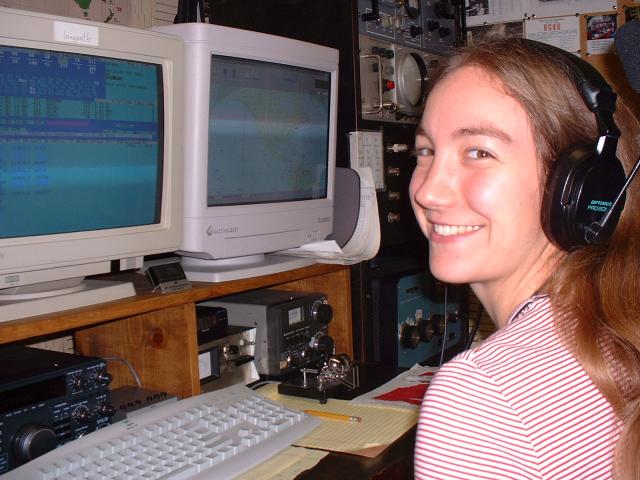

|
N5XU participated in the Collegiate Championship conducted during the weekend of 3-4 November 2001. We operated in the Multioperator Single Transmitter (M) class, with W5JLP, AA5BT, KM5TY, and WM5R operating.
This is a significantly better result for us than I had anticipated before the contest. We do not have any crack CW contest operators active in the club anymore. Last year, I operated much of the contest going just 15WPM or so high up in the bands, working every QRP station on the continent, and struggling the entire time. This year, the bulk of our operating was done by Johanna W5JLP, who was operating comfortably at 20WPM by the end of the contest. Johanna made at least 500 of our QSOs.
We began thinking about a sweep early Sunday, as Derek AA5BT had done a few hours of search and pounce Saturday night (about the only time we weren't CQing) and had gotten all but nine or ten of the sections worked. Idaho and Alberta took a disconcertingly long time to work, but by the early afternoon, we were down to three sections needed: SC, VT, and MAR. As it turns out, we worked at least two SC stations, and I was able to get through to a VE9 on 15 who was just incredibly weak here, but we never did find a Vermont station. I'm sure none were CQing at all on Sunday, and I guess we just weren't attractive enough for one of them to call us.
As someone whose CW skills are still substantially below those of the average CW contester, it continues to be very frustrating to be called by stations averaging 25-30% faster than my sending speed. Another big frustration was really poor CW signals. I noticed a lot more stations with a "Farnsworth-like" approach to CW, where the signal might have been at 22WPM, but the spacing was at like 32WPM. To my ears, this is not helpful. In fact, it made copying really difficult, especially with the weaker signals. Every single time, when someone slowed down to my speed and had a good keying waveform and normal weighting and spacing, the QSO happened with a hitch. Unfortunately, most of the time I had to ask for fills, which just slowed both of us down.
One prominent 0-land contester answered my 15WPM CQ at 30WPM. I figured out his call after hearing it three times, and sent him my exchange at 15WPM. He then proceeded to send me his exchange at 30WPM. I asked him _three times_ to "QRS AGN," and each time he sent it at exactly the same speed, so I had to give up and call CQ again. This was the worst behavior I experienced all weekend, but at least 2/3 of the stations that called me did so at speeds 25-30% faster than I was sending, and required time-wasting fills. Although I resorted to it rarely, _only one_ of the stations that called me and I asked to QRS did so.
It was good to hear a few other college and university clubs on the air, especially those that are avoiding the hated "school radio club" category. I imagine we'll hear many more on for phone, and it will be interesting to see if the trend of fewer and fewer college and university clubs being active in the Sweepstakes (in any category) since the creation of the school radio club category continues.
ScoreThe score below is claimed.
| ||||||||||||||||||||||||||||||
Contest Logging was done with TR LOG contest logging software. The following reports and log were created using TR LOG's post-contest processor.
|
Last Updated 26 June 2020 wm5r@wm5r.org |